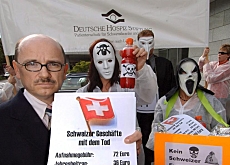Dignitas branch provokes outcry in Germany

The decision by the Swiss assisted-suicide organisation, Dignitas, to open an office in Germany has been harshly criticised by the German authorities.
However, the head of Dignitas has defended the move. The branch opened on Monday.
The justice ministry of Lower Saxony – the state in which Hanover is located – said on Friday that it intended to pass a new law making it illegal to give professional advice on suicide.
Dignitas’s move has also been condemned by the German medical association. “Assisted suicide is killing on demand and that is forbidden in Germany,” said the association’s president, Jörg-Dietrich Hoppe, earlier this week.
“The patient has a right to a dignified death but does not have the right to be killed,” Hoppe said in a news release. “We doctors therefore categorically reject assisted suicide.”
This is a view shared by Lower Saxony’s Health Minister Ursula von der Leyen and the state’s Evangelical Lutheran bishop Margot Kässmann, who released a joint statement.
“Dignitas is going down the wrong path,” they said in a message published on the health ministry’s website.
Half are German
But for Dignitas, opening a branch in Germany was a natural choice as more than half the number of people seeking its services in Switzerland are from Germany, said the charity’s general-secretary Ludwig Minelli.
“In the past seven and a half years, there have been 453 persons who we’ve assisted to commit suicide here in Switzerland, and 253 of them have been German,” Minelli told swissinfo.
He said the German office was set up on the “initiative of our German friends”, who would run it on a day-to-day basis, but he would be the president.
The main goal of having a German branch was to push for change in German legislation on assisted suicide and to offer advice to local members, said Minelli.
He quoted statistics on the high rate of suicide in Germany, which he said was linked to the topic being a taboo.
The situation could be remedied “if the Germans would take as a starting point that suicide is a marvellous institution for human beings” because, he said, they can think for themselves, opening up “the possibility to withdraw from unbearable situations”.
Travel agent
He added that someone interested in exercising the right to assisted suicide would require advice.
“You do not leave for a great journey without having consulted the travel agency nor do you leave without having said goodbye to your family and friends,” Minelli explained.
When asked if the Hanover branch would function as a travel agency, he denied that this was the case as Dignitas was not a “commercial company but an association”.
However, he admitted that Dignitas’ hands were tied by the legal situation in Germany.
“[The new branch is] not an agency for sending people to Switzerland but as long as we can’t get the medicine sodium pentobarbital in Germany, we have no other possibility for an assisted suicide [than bringing them here],” he said.
He added that, in any case, 70 per cent of members who approached his organisation for help in recent years did not go on to have an assisted suicide.
These were members who had passed an assessment for suitability and had been informed that a physician had been found who was willing to prescribe them the deadly drug.
“They know that the emergency exit is wide open but they do not use it,” Minelli noted.
Support
The German Society for Dying with Dignity (GSDD), which has 35,000 members, welcomed Dignitas’ decision to open an office on German soil.
It is, by its own admission, the only other organisation in Germany fighting for assisted suicide to be decriminalised.
“Dignitas Germany has been established to try to improve the legal situation [on assisted suicides] in this country,” board member Jürgen Heise told swissinfo.
German legislation is tighter than Swiss law on euthanasia and assisted suicide. Active euthanasia is illegal in Switzerland, while assisted suicide is not.
In the latter, the patient has to physically carry out the final act without outside help.
Euthanasia is defined as administering a lethal drug to a person by a doctor or medical staff.
Across the border in Germany, Heise explained, it was possible to help individuals to kill themselves.
“However, this assistance comes to an end in cases where death begins with unconsciousness – under German law, the helper must then call emergency services,” Heise said.
This was different to Switzerland, where people in seemingly hopeless situations, suffering from incurable and painful diseases could be assisted to commit suicide.
“Dignitas and GSDD want such an exception to be made in Germany too,” said Heise.
If this change took place, he agreed that this could stem the flow of “suicide tourists” from Germany into Switzerland.
He told swissinfo that the two organisations would not be cooperating officially but have pledged to help one another reach a common goal.
“We see ourselves as two football teams, [playing on the same field, striving towards] legislative change,” said Heise.
Minelli added that there were no plans to open other offices in other countries.
swissinfo, Faryal Mirza
German legislation is tighter than the Swiss on euthanasia and assisted suicide.
Active euthanasia is illegal in Switzerland, while assisted suicide is not.
In the latter, the patient has to physically carry out the final act without outside help.
Euthanasia is defined as administering a lethal drug to a person by a doctor or medical staff.

In compliance with the JTI standards
More: SWI swissinfo.ch certified by the Journalism Trust Initiative











You can find an overview of ongoing debates with our journalists here . Please join us!
If you want to start a conversation about a topic raised in this article or want to report factual errors, email us at english@swissinfo.ch.